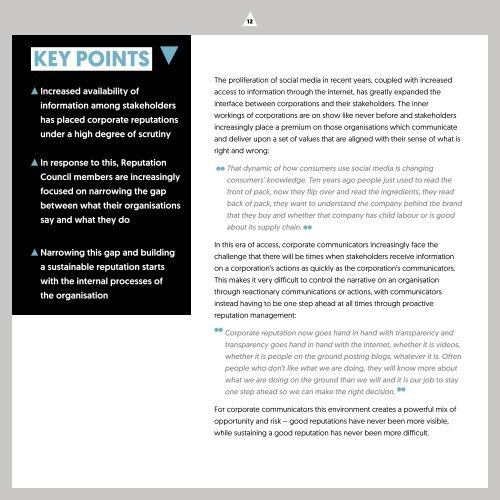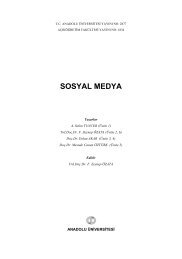THE REPUTATION COUNCIL
Ipsos%20Reputation%20Council%202015%20Report
Ipsos%20Reputation%20Council%202015%20Report
Create successful ePaper yourself
Turn your PDF publications into a flip-book with our unique Google optimized e-Paper software.
12 13<br />
KEY POINTS<br />
Increased availability of<br />
information among stakeholders<br />
has placed corporate reputations<br />
under a high degree of scrutiny<br />
In response to this, Reputation<br />
Council members are increasingly<br />
focused on narrowing the gap<br />
between what their organisations<br />
say and what they do<br />
Narrowing this gap and building<br />
a sustainable reputation starts<br />
with the internal processes of<br />
the organisation<br />
The proliferation of social media in recent years, coupled with increased<br />
access to information through the internet, has greatly expanded the<br />
interface between corporations and their stakeholders. The inner<br />
workings of corporations are on show like never before and stakeholders<br />
increasingly place a premium on those organisations which communicate<br />
and deliver upon a set of values that are aligned with their sense of what is<br />
right and wrong:<br />
That dynamic of how consumers use social media is changing<br />
consumers’ knowledge. Ten years ago people just used to read the<br />
front of pack, now they flip over and read the ingredients, they read<br />
back of pack, they want to understand the company behind the brand<br />
that they buy and whether that company has child labour or is good<br />
about its supply chain.<br />
In this era of access, corporate communicators increasingly face the<br />
challenge that there will be times when stakeholders receive information<br />
on a corporation’s actions as quickly as the corporation’s communicators.<br />
This makes it very difficult to control the narrative on an organisation<br />
through reactionary communications or actions, with communicators<br />
instead having to be one step ahead at all times through proactive<br />
reputation management:<br />
Corporate reputation now goes hand in hand with transparency and<br />
transparency goes hand in hand with the internet, whether it is videos,<br />
whether it is people on the ground posting blogs, whatever it is. Often<br />
people who don’t like what we are doing, they will know more about<br />
what we are doing on the ground than we will and it is our job to stay<br />
one step ahead so we can make the right decision.<br />
For corporate communicators this environment creates a powerful mix of<br />
opportunity and risk – good reputations have never been more visible,<br />
while sustaining a good reputation has never been more difficult.<br />
Increased access to information and channels of communication have<br />
also facilitated greater voice for stakeholders. As a result, corporate<br />
communicators often find themselves competing to shape the message<br />
around their organisation. In absence of a strong reputation, conflicting<br />
points of view from vocal and influential stakeholders are given credence,<br />
placing an organisation in a defensive communication stance:<br />
We have seen a tremendous amount of negative press coverage as<br />
a business and what you are seeing is that because we are not as<br />
well-known as we could be and because people don’t have a sense<br />
of the business in a human way it makes it easier for us to be a target<br />
of negative campaigns, even when they are not based in fact.<br />
However, alongside these risks, there are also many benefits and in cases<br />
where organisations have a strong reputation, council members note that<br />
this has led to increased licence to operate, the ability to attract and<br />
retain the best talent, enhanced customer trust and loyalty and, very<br />
importantly in this era of access, the benefit of the doubt in cases<br />
where things go wrong:<br />
“Reputation is equity in the bank. Sometimes things happen and you need<br />
to be viewed as responsible and having a strong reputation so that you can<br />
tap into some of that equity you’ve built.”<br />
In recognition of these opportunities and risks, corporate communicators<br />
often now have a seat at the top table in their organisation, and though<br />
having this level of influence is a key first step in building a sustainable<br />
reputation, council members highlight that there are several other<br />
processes that should be followed:



